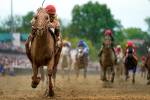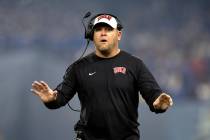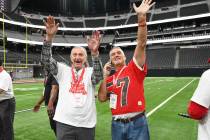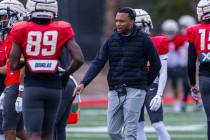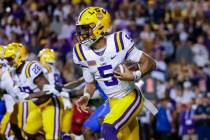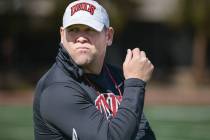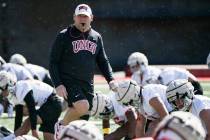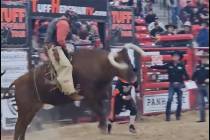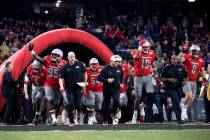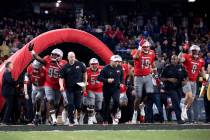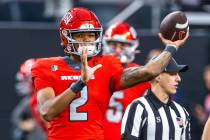Rebels’ brain trust still on same page
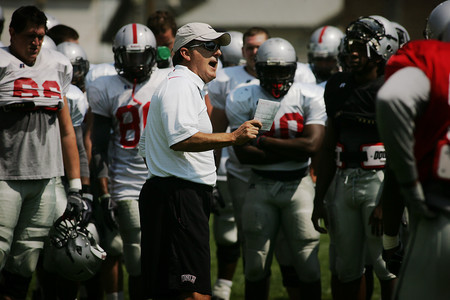
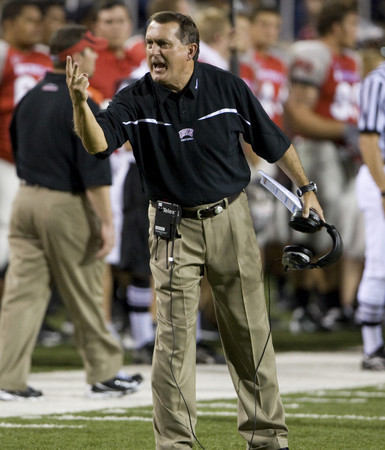
ELY — An accomplished play-caller when he arrived in Las Vegas in December 2004, Mike Sanford decided to keep that responsibility as UNLV’s football coach.
His play-calling, after all, was instrumental in Utah’s undefeated season and Fiesta Bowl appearance that year. And he was transplanting the Utes’ shotgun spread offense to UNLV.
Sanford came to realize, however, the difficulty of deciding what to call on third-and-2 while at the same time attempting to breathe life into a bottom-feeder program.
He said much of his time was spent “observing players, talking to players and changing the mentality. There was so much going into that, I felt I needed to devote more time into that than calling plays.”
So after two seasons, Sanford hired offensive coordinator Todd Berry and gave him the play-calling duties.
Friday was the first time Sanford publicly said he handled play-calling in his first two seasons instead of then-offensive coordinator Noah Brindise, who resigned after the 2006 season.
Even though Sanford no longer makes the calls, he works closely each game week with Berry and the other offensive coaches to decide what to call in which situations.
So when it comes to the game, Berry has a menu of plays from which to choose. Not only are the options specific to the situation — first and second downs being more of an exception — calls also are made with the idea of setting up plays later.
“He and I are on the exact same page as far as what we’re doing offensively,” Sanford said. “I feel 100 percent comfortable with him calling the plays and with me concentrating on the things that I need to do as a head coach with the decision-making, with just the subtle things that go on on a team.”
UNLV’s offense took a noticeable upturn last year, the second season under Berry, improving by a touchdown per game to a 25.6-point average. That was the Rebels’ highest scoring average since 2001.
The total offense actually was down a little, from 353.2 yards to 345.0 per game, but UNLV excelled in the red zone, leading the Mountain West Conference and tying Ohio State for first nationally with a 94.6 percent scoring rate.
With standout quarterback Omar Clayton, the conference’s best receiving unit and a strong line back, the Rebels could keep improving.
“It’s not so much I feel good about the plays (Berry is) calling, it works because I understand why he’s calling the plays,” Clayton said.
Continued success isn’t certain, but Sanford doesn’t envision a situation in which he might take back the play-calling duties.
Almost certainly not while Berry remains at UNLV. Should he leave, the dynamic might change.
“All I know is right now I’m very comfortable with the way we are doing it,” Sanford said.
It’s difficult to argue against Sanford’s success in calling plays. Utah averaged 43.3 points per game in 2004.
“I like the idea” of Sanford calling plays, said former tailback Frank Summers, a rookie with the Pittsburgh Steelers. “He obviously took a great team a few years back to a (Bowl Championship Series) bowl game calling plays.”
Sanford will step in when certain situations arise, such as taking a chance with a deep pass without designating which specific play to call.
With a 40-second play clock, it’s not as if Berry or Sanford have a lot of time to discuss specifics anyway.
The coaches use the upcoming opponent’s videotape to rehearse calling plays.
“As soon as the ball is down, basically the next play is coming in,” Berry said. “It happens that fast. It’s not one of those things where it’s, ‘OK, let’s discuss this.’ We discuss in between series.”
Though they collaborate on the game plan, Sanford lets Berry coach.
Not having to worry about the head coach jumping in or taking over completely is something Berry, a former head coach at Army and Illinois State, appreciates.
“Then you don’t become tentative in the call,” Berry said. “You get the call in. You run the play.”
Contact reporter Mark Anderson at manderson@reviewjournal.com or 702-387-2914. Read the latest practice reports at lvrj.com/blogs/unlv_sports.







